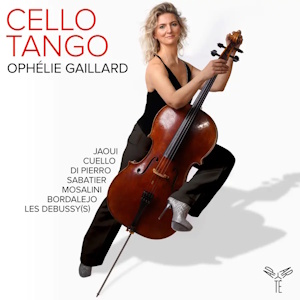
Cello Tango
Ophélie Gaillard (cello)
William Sabatier (bandoneon)
rec. 2024, Pavillon de la Sirène, Paris & Lion Studios, Savigny, France
Reviewed as lossless download
Aparté AP368 [98]
Ten years ago, French-Swiss cellist Ophélie Gaillard released an album of mostly Latin American music which I reviewed with mixed feelings, mainly because of the mish-mash of styles. She returns to that idiom here, but this time the music has a much narrower stylistic range, and this is to the album’s benefit. But lest you think that it is 98 minutes and 26 tracks that all sound the same, four of the pieces are songs, and among the instrumental works, there is plenty of variation.
The programme has a good spread of composers, but unsurprisingly Piazzolla and Ginastera are the dominant figures. To my complete lack of surprise, I found the Ginastera works the hardest going. Puneña, for solo cello, allows Gaillard to show her skills, the cello making all manner of uncello-like sounds, but not something I would want to listen to again. Pampeana, for cello and piano, had somewhat softer edges, while the two songs for male voice, cello and guitar were much lighter, but didn’t grab me.
The Piazzolla works were a different matter, with some standards – La muerte del angel, Oblivion & Otoño (from Las Cuatro Estaciones Porteñas) – mixed in with some much less common works, including one aria from his tango opera, María de Buenos Aires, which is a standout. Oblivion is presented in its relatively rare vocal form (I have ten other versions of it, all instrumental), and the dark, smoky voice of Agnès Jaoui makes for a quite different feel. Otoño, in a version with bandoneon, is quite a deal slower than the other version I have in a similar instrumentation, trading momentum for drama, and I am two minds about it. Viaje de bodas, the first Piazzolla piece on the album, is new to me, and in an arrangement for the duo of cello and bandoneon, and one can imagine the two instruments representing the dancing couple. It is another standout.
Of the works by the lesser-known composers, my pick would be Desde el alma by Rosita Melo, an Argentine-Uruguayan pianist and composer (1897-1981), and Wikipedia tells me that her best known work is indeed this piece, described as a criollo waltz.
Obviously the recording is mainly about Ophélie Gaillard, and she plays with great feeling, verve and passion throughout. The same could be said for each of her colleagues, and the sound engineer has done an equally good job. The booklet notes, written as an interview with Gaillard and Sabatier, provide a good balance of the performers’ thoughts on tango and on the works themselves.
In conclusion, it is a recording that I have enjoyed, the Ginastera works excepted, and there are some real highlights among the lesser-known Piazzolla selections.
David Barker
Buying this recording via a link below generates revenue for MWI, which helps the site remain free


Contents
Osvaldo Pugliese
Negracha
Astor Piazzolla
Viaje de bodas
María de Buenos Aires: Yo soy María
Fuga y misterio
Vayamos al diablo
Las Cuatro Estaciones Porteñas: Otoño porteño
Milonga for Three
Alberto Ginastera
Puneña no. 2 op. 45
Pampeana no. 2 op. 21
Astor Piazzolla
Milonga sin palabras
Regreso al amor
La muerte del angel
Oblivion
Carlos Gardel/Alfredo Le Pera
Volver
Rosita Melo
Desde el alma (vals)
Julián Plaza
Nocturna (Milonga)
Mercedes Sosa
La Zafrera
Alberto Ginastera
Dos canciones op. 3
Gerardo Matos Rodríguez
La cumparsita
Other performers
Juanjo Mosalini (bandoneon)
Tomás Bordalejo (guitar)
Romain Lecuyer (double bass)
Émilie (Aridon-Kociołek piano)
Inés Cuello (voice)
Nahuel di Pierro (voice)
Agnès Jaoui (voice)
Les Debussy(s): Christophe Collette (violin), Emmanuel Bernard (violin), Vincent Deprecq (viola)

















